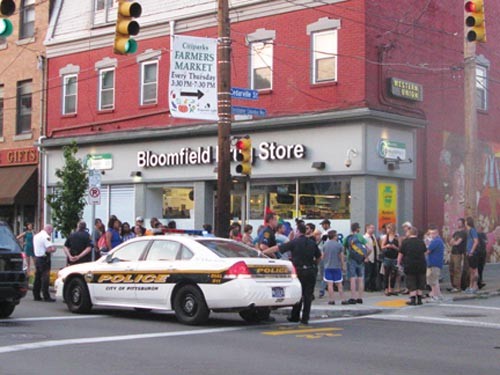Some 100 demonstrators gathered in Bloomfield on Aug. 24, demanding justice after a same-sex couple was threatened with a gun the night before. So far, however, the only people arrested have been five of the demonstrators -- an unfortunate symbol, some say, of the frequent disconnect between police and the LGBT community.
The protest had its roots in an altercation on Aug. 23. Lauren Jurysta and Cheryl Sedlock were walking down Liberty Avenue holding hands around 9 p.m., when they say three white men in T-shirts and baggy jeans came out of the Pleasure Bar. As both groups crossed Liberty Avenue, one of the men, the women say, called the couple "fucking dyke bitches." The confrontation quickly escalated, until one man pulled a gun out of his pants and held it to Jurysta's head -- "almost between my eyes." The confrontation continued another couple minutes, Jurysta says, until the man's cohorts pulled him away.
"In the eight years of being a dyke walking around the streets with my girlfriends, I've felt threatened before," Jurysta says. But "I've never had a gun held to my head for being gay."
"As forward-thinking as things are here in Pittsburgh in terms of LGBT issues, homophobia is still alive and well," says openly gay city Councilor Bruce Kraus. "It takes the face of violence."
A protest was called the next day, organized through Facebook and text message. But there was no permit for the event, and city police say that some demonstrators ignored instructions to keep the sidewalk clear or else move to nearby Friendship Park.
Those rallying tell a different story. "The aggressive response of the police stood in stark contrast to the completely non-violent and non-destructive rally to speak out against a very real violence perpetuated against a member of the Pittsburgh and LGBT communities," says David Japenga, one of the arrestees, in a statement to City Paper.
Five were arrested on charges of obstructing pathways and failure to disperse, and two of them were additionally cited for resisting arrest. Meanwhile, police tactics have been called into question. The Citizen Police Review Board has opened an inquiry on the incident, according to the board's executive director, Beth Pittinger.
Subsequent media reports focused on the police confrontation: The Pittsburgh Post-Gazette spent the bulk of its story discussing the arrests and describing Japenga's arrest and police record: In 2009, he smashed $15,000 worth of windows during the G-20 summit held in Pittsburgh. That's more than triple the space the paper devoted to Jurysta's account of being held at gunpoint. The Tribune-Review, meanwhile, wrote about Japenga almost exclusively, only briefly mentioning that he'd attended a rally "against violence toward gay people."
That focus upsets some LGBT activists. "There's a drunk homophobe in Bloomfield running around with a gun, and no one is doing anything about that," says Thomas Waters, a local gay blogger. "That's what really harms our community."
Jurysta, who has filed a police report concerning the Aug. 23 incident, also worries about exacerbating tension between the LGBT community and police. "It definitely wasn't good for the future of gay-bashing reports if people don't trust the cops to begin with."
In May 2010, a drag queen was beaten by a group of men in the same part of Bloomfield but did not file a police report. The allegations drew considerable attention, but some in the LGBT community said victims of anti-LGBT harassment and violence have had bad experiences filing police reports. Another victim, Sena Hockenberry, told CP at the time that police had been "insentitive" when she called to report getting attacked, which discouraged her from filing a report.
The city's police bureau says that officers go through cultural-diversity training. The department "maintains an open line of communications with the members of the LGBT community," says Deputy Chief Paul Donaldson in an email to CP. "We realize the added significance of an assault of an LGBT member and conduct professional investigations, in an effort to identify the individuals who are responsible."
The law itself isn't always sympathetic to LGBT victims: Pennsylvania's hate-crimes law doesn't cover attacks motivated by homophobia. But Jurysta hopes that if more people report such incidents, "it will show the state there are hate crimes."
"Historically, our relationships with cops haven't been that great, but they were helpful to me," she says. "In order to change anything, we have to file reports."















